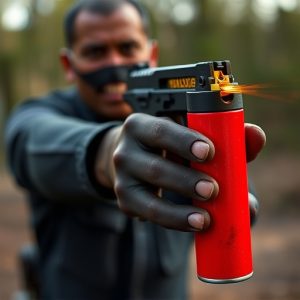Storing Pepper Spray at Home: Legal, Safe, and Effective Use
Storing pepper spray at home requires securing it in a locked container, high up and away from child…….
Storing pepper spray at home requires securing it in a locked container, high up and away from children, in a cool, dry place with optimal ventilation. Regularly check expiration dates, practice handling techniques, and maintain accessibility during emergencies. Comply with local laws and use multiple backup sprays for enhanced protection; training enhances its effectiveness as a personal defense tool.
“In today’s uncertain times, civilian protective measures like defensive spray have gained prominence. This comprehensive guide explores an effective self-defense tool: pepper spray. We delve into its composition, showcasing how capsaicin creates a temporary but powerful distraction. Beyond legalities and storage tips for safe keeping at home, we emphasize safety training—a crucial aspect often overlooked. Maximize your protection with practical measures, ensuring peace of mind in an unpredictable world.”
- Understanding Pepper Spray: Its Composition and Effectiveness
- Legal Considerations and Regulations for Civilian Ownership
- Storing Pepper Spray Safely at Home: Tips and Best Practices
- Training and Safety Measures: Maximizing Your Protection with Pepper Spray
Understanding Pepper Spray: Its Composition and Effectiveness
Pepper spray, a powerful tool for personal defense, contains capsaicin, the active ingredient derived from chili peppers. This chemical irritates the eyes, nose, and respiratory system, temporarily disabling an attacker. The effectiveness of pepper spray lies in its ability to provide a non-lethal, rapid response, allowing users to create distance from dangerous situations.
When storing pepper spray at home, it’s crucial to keep it out of reach of children and unauthorized individuals. Ideally, store it in a secure, locked container in a cool, dry place. Ensure the area is well-ventilated to prevent any buildup of spray residue. Regularly check the expiration date and practice handling the spray to familiarize yourself with its use, ensuring its readiness when needed.
Legal Considerations and Regulations for Civilian Ownership
In many regions, civilians are allowed to own and carry pepper spray for self-defense, but there are stringent legal considerations and regulations to adhere to. Before purchasing and storing pepper spray at home, it’s crucial to understand local laws and restrictions. Failure to comply can result in severe penalties or confiscation of the spray. Each jurisdiction has its own set of rules regarding who can possess pepper spray, where it can be carried, and how much can be stored.
When storing pepper spray at home, ensure compliance with local regulations by keeping it out of reach of children and unauthorized individuals. It should be placed in a secure location, typically locked away, to prevent misuse or accidental discharge. Many areas mandate specific storage requirements, such as locking compartments or safes designed for pepper spray, to maintain public safety and reduce the risk of abuse.
Storing Pepper Spray Safely at Home: Tips and Best Practices
Storing pepper spray safely at home is a crucial aspect of responsible ownership for civilian protection. Keep it out of reach from children and curious guests by securing it in a locked cabinet or safe, preferably high up and away from floor level. Use child-proof locks to ensure no one can access the spray without your knowledge. Additionally, store it in a cool, dry place to maintain optimal performance; avoid extreme temperatures and direct sunlight.
When not in use, keep the spray capped tightly to prevent the active ingredient from drying out or accidentally activating. Periodically check expiration dates and replace the spray as needed. Regularly review your storage location and ensure it remains accessible during emergencies. Consider having multiple backup sprays stored in different areas of your home for enhanced protection.
Training and Safety Measures: Maximizing Your Protection with Pepper Spray
Training and proper handling are essential components of maximizing protection from pepper spray. Understanding how to use it effectively can significantly enhance your safety, especially when facing potential threats at home or in public. Many self-defense courses offer training on pepper spray as a deterrent, teaching individuals the correct techniques for application, aiming, and managing their reactions during an encounter.
When storing pepper spray at home, ensuring safety is paramount. Keep it out of reach of children and unsecured areas to prevent accidental discharge. Store it in a cool, dry place, away from direct sunlight, and always follow manufacturer guidelines for proper storage. Regularly check expiration dates and practice trigger control exercises to maintain proficiency.
Pepper spray offers civilians an effective, non-lethal self-defense option. By understanding its composition, legal considerations, safe storage practices, and proper training, individuals can maximize their protection in various scenarios. Storing pepper spray at home is a proactive step towards personal safety, ensuring it’s readily available when needed. Remember, knowledge and responsible handling are key to making the most of this valuable tool for self-defense.


